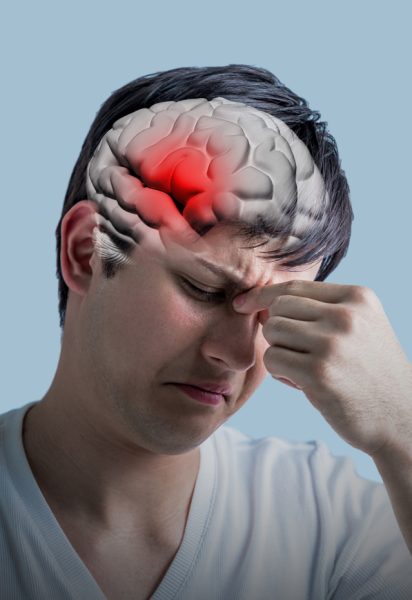Brain

Genetic Disorders - Brain
What Is A Genetic Brain Disorder & What Are The Symptoms?
A genetic brain disorder is a condition caused by a mutation in one or more genes that affect the development or function of the brain. There are many genetic brain disorders, and the symptoms can vary depending on the specific condition.
Some common symptoms include intellectual disability, seizures, problems with movement, and abnormal behavior. In some cases, people with a genetic brain disorder may also have physical abnormalities, such as small head sizes or facial deformities. Genetic brain disorders can be difficult to diagnose because the symptoms can vary widely from person to person.
In addition, many of these conditions are rare, so doctors may not recognize them unless they are specifically looking for them. Although there is no cure for most genetic brain disorders, early diagnosis and treatment can often improve the symptoms and help people with these conditions lead full and productive lives.

How Is Genetic Brain Disorder Diagnosed And Treated?
A brain disorder caused by a change in the DNA is called a congenital or hereditary brain disorder. These types of disorders can be passed down from parents to children. Some examples of gene brain disorders include Huntington’s disease, Alzheimer’s disease, and sickle cell anemia. These disorders can cause problems with thinking, movement, and emotions.
Genetic brain disorders are diagnosed by doing a medical history and physical exam. The doctor will also ask about family history. A blood test, MRI, or CT scan may also be done. Treatment may include medicine, therapy, and surgery. Some disorders cannot be cured, but treatment can help manage symptoms.
What Are The Possible Causes Of A Genetic Brain Disorders?
There are several possible causes for genetic brain disorders. One is a mutation, an error in the DNA that codes for a protein. This can happen randomly or be passed down from one generation to the next. Another possibility is chromosomal abnormalities, which occur when there is an error in the structure of the chromosomes.
Mutations can also cause this, or it can be the result of problems during cell division. Finally, issues with epigenetics (the chemical modification of DNA) can also lead to genetic brain disorders. These disorders can be caused by exposure to environmental toxins, or they can result from changes in lifestyle or diet. Ultimately, the cause of a genetic brain disorder is often unknown. However, research into the causes of these disorders is ongoing, and discoveries are being made all the time.
What Is The Diagnosis For Someone With A Genetic Brain Disorder?
The prognosis for someone with a genetic brain disorder can vary depending on the type and severity of the disorder. In general, however, most people with a genetic brain disorder will experience some cognitive impairments and require lifelong care. In some cases, people with a genetic brain disorder may also experience physical impairments, such as seizures or paralysis. While there is no cure for a genetic brain disorder, early diagnosis and treatment can help improve symptoms and quality of life. With advances in medical technology, more people are living longer and healthier lives with a genetic brain disorder. However, the challenges of living with a chronic condition can be significant, and many people with a genetic brain disorder require support from family, friends, and caretakers to manage their condition.
How Can You Cope If You Have A Loved One With A Genetic Brain Disorder?
It can be difficult to know how to cope if you have a loved one with a genetic brain disorder. The first thing to remember is that you are not alone. Many resources and support groups are available to help you through this difficult time. Additionally, it is important to be patient and understand that your loved one may not be able to communicate or express their feelings in the same way as someone without the disorder. They may also require special care and assistance with everyday tasks. However, despite these challenges, having a close and meaningful relationship with your loved one is still possible. By being patient, supportive, and understanding, you can help them through this difficult time.
Neuro Disorders
What Are Neuro Disorders And What Causes Them?
Neuro disorders affect the nervous system, including the brain, spinal cord, and peripheral nerves. These disorders can result in many symptoms, including muscle weakness, paralysis, seizures, and headaches. While there are many different types of neuro disorders, they all share one commonality: they disrupt the normal function of the nervous system.
There are many different causes of neuro disorders. In some cases, they are caused by genetic mutations passed down from generation to generation. In other cases, they may be caused by physical injury or disease. However, in many cases, the exact cause of a neuro disorder is unknown.
Despite their varied causes, neuro disorders all have one thing in common: they can profoundly and profoundly affect a person’s life. Thankfully, treatments available can help lessen the symptoms of these disorders and improve a person’s quality of life.

How Do Neuro Disorders Affect People’s Lives?
The human brain is a complex organ, and the consequences can be devastating when something goes wrong. Neuro disorders like Alzheimer’s disease, Parkinson’s disease, and cerebral palsy can profoundly impact a person’s ability to think, move, and communicate.
In some cases, the symptoms of a neuro disorder can be so severe that they hinder a person’s ability to live independently. In other cases, the signs may be more subtle, but they can still make it difficult for a person to function in day-to-day life. Regardless of the severity of the symptoms, neuro disorders can profoundly affect a person’s quality of life.
In many cases, they can lead to isolation, depression, and anxiety. They can also put a strain on relationships and cause financial difficulties. For all these reasons, it is important to be aware of the potential impact of neuro disorders and seek help if you or someone you know is affected by one.
Treatment Options And How To Manage Neuro Disorders
Neuro disorders can be difficult to manage, and treatment options vary depending on the condition. For example, treatment for Parkinson’s disease may include medication, surgery, and lifestyle changes, while treatment for Alzheimer’s disease may involve medication, support groups, and memory aids.
Working with a healthcare team to develop a treatment plan tailored to your needs is important. In some cases, neuro disorders can be managed effectively with medication and lifestyle changes. However, in other cases, more aggressive treatment may be necessary.
Regardless of the approach, it is important to remain patient and focus on the positive aspects of life. Many resources are available to help you manage your neuro disorder and improve your quality of life.
The Importance Of Support Groups For People Living With Neuro Disorders
People with neuro disorders often face many challenges that can be difficult to overcome independently. Support groups provide a space for people to come together and share their experiences, offering advice and support to each other. In addition to providing emotional support, these groups can offer practical assistance, such as help with finding treatment options or connecting with other resources. Support groups can be an invaluable resource for people with neuro disorders, helping them cope with daily life’s challenges.
Resources For Finding Information And Support
When you’re struggling with your mental health, knowing where to turn for help can be hard. However, many resources are available that can provide information and support. Your first step should be to talk to your doctor. They can provide you with an evaluation and determine whether you need medication or therapy.
You can search for one online or ask your doctor for a referral if you decide to see a therapist. There are also many hotlines and online forums that can offer support and guidance. And finally, don’t forget about your friends and family. They may not be professionals, but they can provide a listening ear and a shoulder to cry on. When it comes to mental health, there is no one-size-fits-all solution. But with a little effort, you can find the help and support you need.